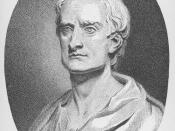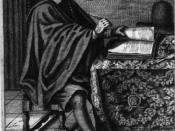The Scientific Revolution shifted focus from Church authority to the authority of science and reason. Fresh concepts in science added to our understanding of the world around us: a new view of the solar system (Kepler and Galileo), a closer look at the human body and its functions (Vesalius), and the detailed workings of nature (Pascal and Newton). Philosophical ideas of the time resulted in our modern logic: supremacy of questioning (Descartes) and supremacy of God over the universe (Newton). This new era produced unique perspectives that had the potential to desecrate commonly held Western Christian values. Sir Isaac Newton and the combined efforts of both scientists and Christian theologians reconciled Christian values with science.
Platonic and neoplatonic philosophies of the ancient world and the Renaissance, respectively, ushered in the new thought of the Scientific Revolution. Platonism revolves around the concept of a central source from which everything emanates. Copernicus, one of the minds that created the Revolution, based his concept of planetary bodies revolving perfectly around the sun on Platonism.
Copernicus' "discovery" is completely overrated: he had no reasoning for his assertion and could not verify his conclusion with anything concrete. Oddly enough, the new Protestant movement criticized and rejected the Copernican view of the solar system before Catholicism. Protestants had no true tradition that would compel them to condemn the idea, so the assumption is that the two Churches (Roman Catholic and Protestant) were still very close at this early stage in the Reformation and had similar values and traditions. Copernicus really threatened the traditions of Western Christians but not on their values. There is a significant difference between traditions and values: traditions are largely inflexible, unwritten customs passed between generations without an emotional tie. Values form the core of an individual or a religion that are...


